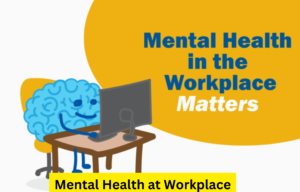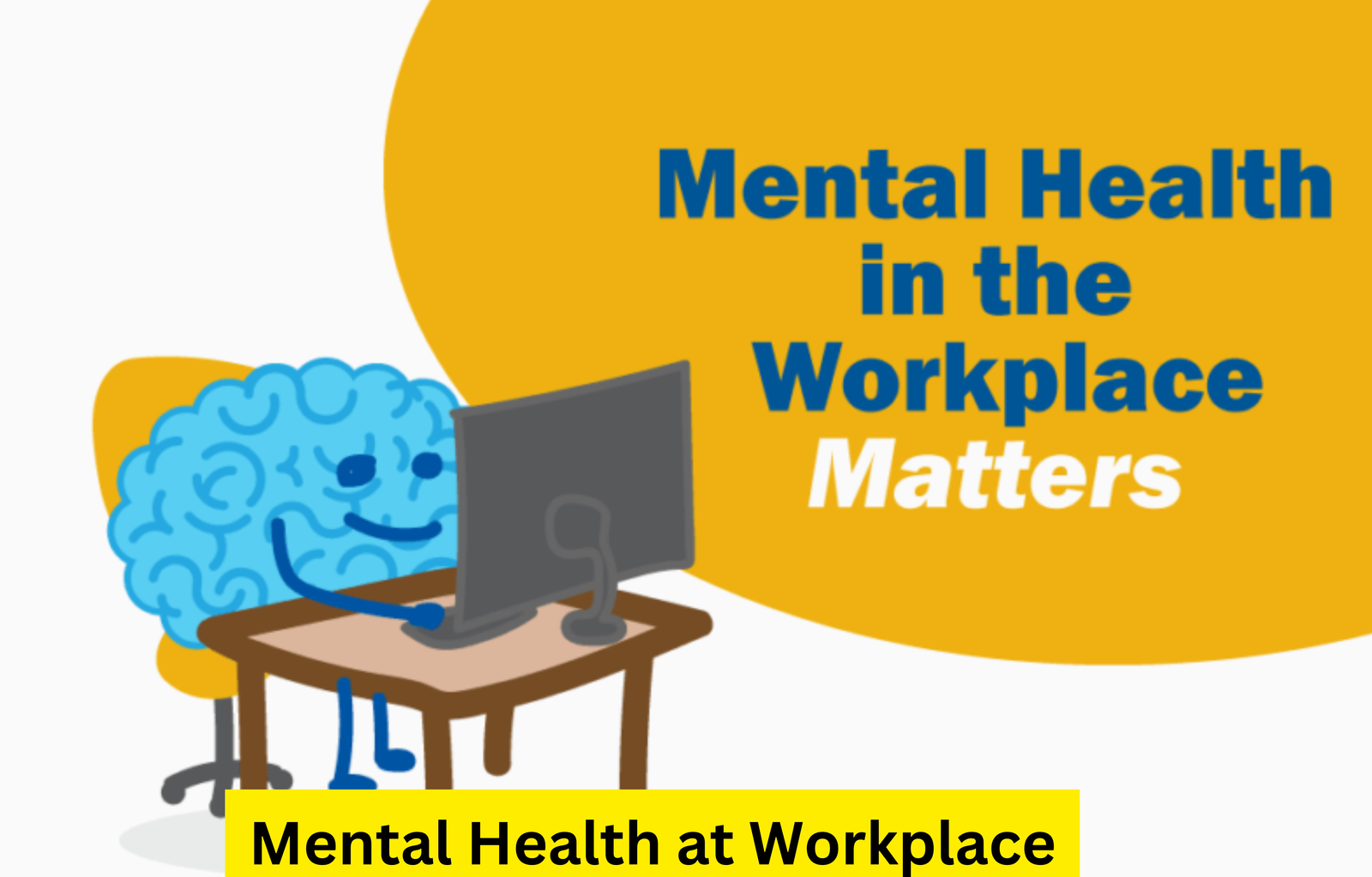Mental Health at Work: Why It Matters and How to Support It

The workplace is a critical environment that can significantly influence an individual’s mental health. Whether due to long hours, tight deadlines, or high-stress environments, work can often become a source of mental strain. Conversely, a healthy work environment can promote mental well-being, productivity, and job satisfaction.
This article explores the importance of mental health at work, the impact of workplace stress, the role of employers in supporting mental well-being, and practical strategies to create a mentally healthy workplace.
Why Mental Health at Work Matters
Mental health is as crucial as physical health when it comes to overall well-being, especially in the workplace. Employees’ mental health affects their ability to focus, be productive, and maintain healthy relationships with colleagues. In recent years, there has been growing recognition of the need to address mental health issues in the workplace, and for good reason.
According to the World Health Organization (WHO), poor mental health costs the global economy approximately $1 trillion in lost productivity each year. Beyond productivity losses, untreated mental health issues can lead to absenteeism, presenteeism (where employees are present but not fully functioning), and higher turnover rates. Therefore, supporting mental health in the workplace is not just a moral responsibility but also an economic imperative.
The Impact of Mental Health at work
Workplace stress is a significant factor contributing to poor mental health. Common sources of workplace stress include:
- High workloads: Excessive work demands and unrealistic deadlines can lead to chronic stress and burnout.
- Lack of control: Employees who feel they have little control over their tasks or decision-making may experience heightened anxiety.
- Job insecurity: Fear of losing one’s job or facing financial instability can exacerbate stress and mental health issues.
- Poor work-life balance: An imbalance between work responsibilities and personal life can contribute to mental strain and emotional exhaustion.
- Toxic work culture: A hostile or unsupportive work environment can worsen existing mental health problems or lead to new ones.
Without proper interventions, workplace stress can lead to mental health conditions like anxiety, depression, and burnout, which, if left untreated, can have long-lasting consequences on both individuals and organizations.
Common Mental Health at work Issues in the Workplace
While any employee can experience mental health challenges, there are certain conditions commonly linked to workplace stress and pressure:
1. Burnout
Burnout is a state of emotional, physical, and mental exhaustion caused by prolonged stress, often in the workplace. Symptoms include feeling drained, detached, and cynical about work, as well as a decrease in performance. Burnout can affect an employee’s personal life and lead to long-term mental health conditions if not addressed.
2. Anxiety
Anxiety disorders can be exacerbated by high-stress environments. Employees may feel constant worry or fear, impacting their ability to perform tasks effectively. Symptoms include restlessness, difficulty concentrating, irritability, and physical issues such as headaches and an increased heart rate.
3. Depression
Workplace-related depression can result from chronic stress, lack of support, or job dissatisfaction. Depression is characterized by persistent sadness, lack of interest in previously enjoyed activities, and feelings of worthlessness or hopelessness. It can significantly reduce productivity and motivation.
4. Stress-Related Disorders
Post-Traumatic Stress Disorder (PTSD) can occur in employees who have experienced traumatic events in the workplace, such as accidents, bullying, or harassment. These individuals may relive the traumatic experience and have difficulty functioning in their job roles.
The Role of Employers in Supporting Mental Health at work for Employee
Employers play a crucial role in creating a workplace that promotes mental well-being. Companies that prioritize mental health enjoy a more engaged, motivated, and productive workforce. Here are several ways employers can support mental health at work:
1. Foster an Open and Supportive Culture
Creating an environment where employees feel safe discussing mental health issues without fear of judgment is essential. Employers can encourage open dialogue by normalizing conversations around mental health and offering regular opportunities for employees to voice their concerns.
2. Provide Mental Health Resources
Employers should offer access to mental health resources, such as Employee Assistance Programs (EAPs), mental health hotlines, or partnerships with local counseling services. These resources should be easily accessible and confidential to ensure that employees feel comfortable using them.
3. Train Managers and Staff
Training managers and employees on recognizing the signs of mental health issues is a proactive step toward early intervention. Employers should offer mental health training that teaches staff how to approach someone who may be struggling and provide support without crossing boundaries.
4. Encourage Work-Life Balance
Promoting a healthy work-life balance is key to preventing burnout and mental exhaustion. Employers can implement flexible working hours, remote work options, or policies like the right to disconnect, which allows employees to disengage from work-related communications after office hours.
5. Address Workplace Stress
Employers should identify and address sources of workplace stress. This can be achieved by conducting regular assessments, gathering employee feedback, and implementing strategies to reduce workload pressure, clarify job roles, and create a more balanced and supportive work environment.
6. Offer Mental Health Days
Providing employees with mental health days allows them to take time off when they need to recharge mentally. This practice can prevent burnout and ensure employees return to work refreshed and more productive.
Creating a Mentally Healthy Workplace: Best Practices
Developing a mentally healthy workplace is a continuous process that involves commitment at all levels of the organization. Here are some best practices employers can adopt:
1. Implement Wellness Programs
Wellness programs that focus on mental and physical health can improve overall employee well-being. Offering activities such as yoga classes, mindfulness workshops, or stress-relief sessions can create a supportive environment that encourages mental health awareness.
2. Promote Emotional Intelligence
Encouraging employees to develop emotional intelligence (EQ) can lead to better workplace relationships, improved communication, and enhanced conflict resolution skills. Emotional intelligence helps individuals recognize their own emotions and the emotions of others, which is essential for maintaining a mentally healthy work environment.
3. Regular Mental Health Check-ins
Regular one-on-one meetings between managers and employees can provide opportunities to check in on mental health. These check-ins should be non-intrusive and focused on offering support. Employees who feel their well-being is prioritized are more likely to remain engaged and productive.
4. Enforce Anti-Bullying and Harassment Policies
Workplace bullying and harassment can significantly impact an employee’s mental health. Employers must have strict policies in place to prevent these behaviors and ensure employees feel safe. Reporting mechanisms should be easily accessible, and incidents should be addressed promptly and fairly.
The Benefits of Supporting Mental Health at Work
Prioritizing mental health in the workplace leads to numerous benefits, both for employees and the organization as a whole:
- Increased productivity: Employees with good mental health are more focused, engaged, and efficient.
- Reduced absenteeism: Supporting mental health helps reduce sick days taken for mental health reasons, such as stress and burnout.
- Improved employee retention: Employees are more likely to stay with an organization that prioritizes their mental well-being.
- Better workplace morale: A supportive work environment leads to higher employee satisfaction and a positive workplace culture.
- Lower healthcare costs: Companies that address mental health proactively may see reduced healthcare costs due to fewer mental health-related illnesses.
FAQs About Mental Health at Work
What is workplace mental health?
Workplace mental health refers to the well-being of employees in their professional environment. It encompasses how work affects an individual’s emotional, psychological, and social well-being.
How can employers support mental health at work?
Employers can support mental health by fostering an open and supportive culture, offering mental health resources, providing mental health training, encouraging work-life balance, and addressing workplace stress.
What are the signs of poor mental health in employees?
Signs of poor mental health in employees include increased absenteeism, changes in behavior or mood, decreased productivity, withdrawal from colleagues, and difficulty concentrating.
Why is mental health important for workplace productivity?
Mental health directly affects an employee’s ability to focus, complete tasks efficiently, and collaborate effectively with colleagues. Poor mental health can lead to reduced productivity, increased mistakes, and lower job satisfaction.
What can employees do to maintain good mental health at work?
Employees can maintain good mental health by practicing self-care, setting boundaries between work and personal life, seeking support when needed, and utilizing available mental health resources.
Can workplace stress cause long-term mental health issues?
Yes, prolonged workplace stress can contribute to long-term mental health issues such as anxiety, depression, and burnout. Addressing stress early is crucial to preventing these outcomes.




